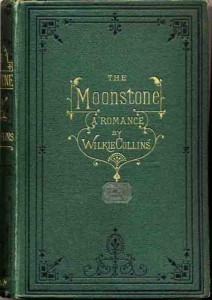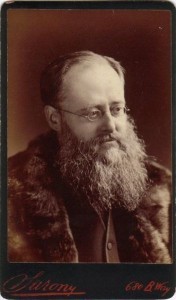On Wilkie Collins (It’s in the details, man!)
 True he’s not my only favorite author. If you know me at all, you’ve likely heard me wax poetic about many a Victorian writer; Dickens, George Meredith, Silas Hocking, George Eliot…. The truth is, I learn so much from classic literature that it not only forms the foundation of my research, it is the foundation of my writing career. I didn’t start as a writer, after all. I started as an avid reader, who got so enthralled in these wonderful stories, that I eventually dared to try my hand at it. But I still must read, read, read in order to learn, learn, learn. It helps me in other ways, too, but chiefest among them is finding the golden nuggets of detail that make a little bit of history clear, or, more exciting still, shatter the preconceptions we’ve allowed to cement about an era that truly was very dynamic. For those details about the day to day lives of men and women (particularly women) in the Victorian era, there’s no one quite like Wilkie Collins.
True he’s not my only favorite author. If you know me at all, you’ve likely heard me wax poetic about many a Victorian writer; Dickens, George Meredith, Silas Hocking, George Eliot…. The truth is, I learn so much from classic literature that it not only forms the foundation of my research, it is the foundation of my writing career. I didn’t start as a writer, after all. I started as an avid reader, who got so enthralled in these wonderful stories, that I eventually dared to try my hand at it. But I still must read, read, read in order to learn, learn, learn. It helps me in other ways, too, but chiefest among them is finding the golden nuggets of detail that make a little bit of history clear, or, more exciting still, shatter the preconceptions we’ve allowed to cement about an era that truly was very dynamic. For those details about the day to day lives of men and women (particularly women) in the Victorian era, there’s no one quite like Wilkie Collins.
First a bit of history. William Collins was born January 8, 1826 in Marylebone, London. His father was a Royal Academy trained landscaper, also named William Collins. Hence the son took his uncle’s middle name, Wilkie, and by it was known most of his life. He lived for a time in Italy and France, when he was a boy of about ten. The time abroad greatly influenced his tastes.
Back home, and at a boarding school, Wilkie Collins was introduced to his creative career, by a bully. The lad tormented Collins and would not let him be until he agreed to tell him a story each night in order to help him get to sleep. Collins only spent two years at that school, but the creative germ took off and never let him go.
In 1843 his first story was published, but his first full length novel, Iolani, which he submitted two years later was rejected, never to be published in his lifetime. In 1851, however, he was introduced to Charles Dickens and a lifetime friendship took off, as well as the making of his career. Many of his works were either published or serialised in Dickens’ paper, “All the Year Round.” His most famous works include The Moonstone, The Woman in White, Armadale and No Name! Which book I’ve just begun and will be leading a discussion on over at Goodreads. So do, please join us. It’s going to be a lot of fun.
So why do I love Wilkie Collins so? Well, as I might have mentioned before … It’s in the details, my friends. In the details!
 There are a great many understood stereotypes with regard to the Victorian era. Women had no rights, therefore had no will or purposeful ambition of their own. Of course this doesn’t make for very interesting storytelling, but one must break those preconceptions gently, so as not to offend the reader. I smirk here. Because if women weren’t strong in the Victorian era, who on earth did all the fighting for their rights? Men? Ha! Ok. I take it back. There were some men, like Collins, and Meredith who played the private and public champions for the cause of women. And I thank them. But for the most part, it took the courage of some very intrepid women in order to get the legistlation passed that would grant them their rights, their separate identities from the men they chose to marry (which I mean to cover in an upcoming post.)
There are a great many understood stereotypes with regard to the Victorian era. Women had no rights, therefore had no will or purposeful ambition of their own. Of course this doesn’t make for very interesting storytelling, but one must break those preconceptions gently, so as not to offend the reader. I smirk here. Because if women weren’t strong in the Victorian era, who on earth did all the fighting for their rights? Men? Ha! Ok. I take it back. There were some men, like Collins, and Meredith who played the private and public champions for the cause of women. And I thank them. But for the most part, it took the courage of some very intrepid women in order to get the legistlation passed that would grant them their rights, their separate identities from the men they chose to marry (which I mean to cover in an upcoming post.)
Needless to say, we modern readers like to read about strong women. We modern writers like to write about them. But at what point to you challenge preconcieved ideas at the risk of being reprimanded? For me, I look for such examples in contemporary literature. Not contemporary to my day, but theirs. And in Collins, it abounds.
See this from Marian Halcombe in The Woman in White:
“Are you to break your heart to set his mind at ease? No man under heaven deserves these sacrifices from women. Men! They are the enemies of our innocence and our peace – they drag us from our parents’ love and sisters’ friendship – they take us body and soul to themselves, and fasten our helpless lives to theirs as they chain up a dog to his kennel. And what does the best of them give us in return? Let me go, Laura – I am mad when I think of it!”
Indeed, it is only because of Marian’s strength that her sister is not grievously robbed by her husband, and that she ever survives her marriage to him.
When it comes to what we understand about fashion trends of the era, Collins likes to say it how it is. Of course all women wore corsets and laced them as tightly as they could. Didn’t they?
Again, from The Woman in White, but this from Mr. Hartright’s point of view, as he first observes Marian.
“Her figure was tall, yet not too tall; comely and well developed, yet not fat; her head set on her shoulders with an easy pliant firmness; her waist, perfection in the eyes of a man, for it occupied its natural place, it filled out its natural circle, it was visibly and delightfully undeformed by stays.”
Yes. That’s what it said! Now whether it means she did not wear a corset or rather that she didn’t tight-lace, I’m not certain. But I find that remarkable. Never before have I read such a thing as that. And that the passage should imply that liked a woman’s figure ‘undeformed by stays’, and that other men would agree with him, rather blew my mind when I first read it.
As I mentioned, I’m presently reading No Name, and so it only seems right that I include a few gems from it as well.
No name hinges on the legal aspects of inheritance and marriage law. I don’t think I will spoil anything for you by telling you that what comes of a marriage solemnised after the birth of a child results in that child being thrown upon the mercy of the world with No Name. But how it comes about is a bit of a puzzle. Fortunately for us modern readers, Collins knew better than to trust us to understand the law as he did. He even goes so far as to doubt that most men understood the consequences of late marriages which were meant to legitimise the births of their children. Well, in the eyes of the English legal system, it didn’t. In fact, it did one worse, by rending a man’s will, however tightly it was written, completely useless upon his marriage. See here:
Up to that moment he, like many other persons, had been absolutely ignorant that a man’s marriage is, legally as well as socially, considered to be the most important even in his life; that it destroys the validity of any will which he may have made as a single man’ ad that it renders absolutely necessary the entire reassertion of his testamentary intention in the character of a husband.
In explaining how all this has come about, it is necessary for the histories of the girl’s parents to be recounted. I’ve studied the rules of courtship. I’ve read countless etiquette manuals and books about it, both contemporary to their time and my own. And what I’ve learned from them is that so many guides and rule books would not have been written if the rules were so very set in stone. One of the rules I’ve used in a piece of my own writing, was that of not dancing with a woman more than thrice in an evening. Hmm. Well, it seems, that while that is the advice given from all quarters, there are still ways and means to skirt it. See here:
There they met. She produced a strong impression on him the moment he saw her. To me, as to him, she was a total stranger. An introduction to her, obtained in the customary manner, informed him that she as the daughter of one Mr. Blake. The rest he discovered from herself. They were partners in the dance (unobserved in that crowded ball-room) all through the evening.
This is interesting on several levels. They danced together and with no one else, I assume that constituted more than three dances. But as they were both strangers, there may well have been those who noticed and wondered, but as they were unknown, there was no gossip to spread, no scandal to form in the wake of it. If the two should form an attachment, who was to stop them? The lawyer, who is telling this tale, refers to an introduction ‘in the usual manner.’ The lawyer was not a stranger there, and he no doubt sought out someone who could introduce his friend to her connections, for she must have been invited by someone.
But that’s beside the point. I value it for the exception to the rules it illustrates.
Another thing I really like about Collins is his apparent fondness and respect for women. Like George Meredith, who also wrote extraordinarily strong women, his admiration for them is apparent. I noted this passage especially.
Her heart was the heart of a true woman. It accepted the conviction which raised Norah higher in her love: it rejected the doubt which threatened to place Magdalen lower.
I hope that is true of women still. I hope it is true of myself. At any rate, I’m a great fan of Collins as you can see. And I’m so excited to be leading the discussion of No Name this month on Goodreads. Do come join us there!
 newest »
newest »





I am so enjoying our current read. Thank you so much for leading this discussion.